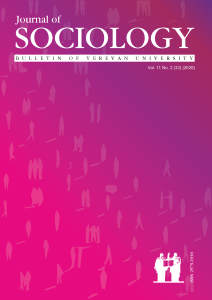Visualization of Social Strata in Media
DOI:
https://doi.org/10.46991/BYSU:F/2020.11.2.003Keywords:
visual communications, social stratification, inequality, social strata, the poor, the rich, middle class, index, icon, symbolAbstract
Visualization of social strata in the media space. - Visual communication is gaining in importance today. The perception of the world around us is mediated by visual images. The visual image cannot be fully expressed by verbal means; it is perceived as a whole, not sequentially. To depict social strata, their detailed definition is necessary, which would make it possible, through indices, icons and symbols, to express culturally specific codes that will create specific cognitive images for the participants in communication. Due to their ideological function, visual images justify unequal power relations in society. It turns out that visualization is an integral part of the endless semiosis of stratification processes and the formation of class identity. However, any visual image is a construct and can be deconstructed. Therefore, through visualization, it is possible to deconstruct or reconstruct the system of social stratification.
References
Hoopes, J. (1991) Peirce on Signs: Writings on Semiotic by Charles Sanders Peirce, University of North Carolina Press
Mead, G.H. (1934) Mind, self, and society: From the standpoint of a social behaviorist, (C. W. Morris, Ed.), Chicago, IL: University of Chicago Press (4) Symbolic Interactionism
Hall, S. (2001) Introduction in Rose G. Visual Methodologies, Sage Publications, p. 6
Marvasti, A. (2004) Qualitative Research in Sociology, Sage Publications, p. 67 Doi: https://doi.org/10.4135/9781849209700
Rose, G. (2001) Visual Methodologies, Sage Publications, p. 70
Hodge, R. & Kress, G. (1988) Social Semiotics. Cambridge: Polity Press
Fyfe, G. & Law J. (1988) Picturing Power: Visual Depiction and Social Relations, London: Routledge, pp. 1-14
Rose, G. (2001) Visual Methodologies, Sage Publications, p. 11
Melkumyan, Yu. (2012) The Problem of Middle Class Construction in the Modern Armenian Society, Banber Yerevani Hamalsarani: Social Sciences, Economics, YSU publishing, Yerevan, p. 8
Berger, J. (1972) Ways of Seeing, British Broadcasting Corporation, p. 10
Hilgartner, S. (2007) Rost i upadok social'nyh problem: kontseptsiya publichnyh aren, Hilgartner, S, Bosk, Ch.L.Sotsial'nye problemy: konstruktsionistskoe prochtenie: hrestomatiya, Kazan, Kazan', pp. 145–184.
Sorokon, P. (1992) Chelovek. Tsivilizatsiya. Obshestvo, Moscow, Izdatel'stvo politiocheskoi literatury
Rose, G. (2001) Visual Methodologies, Sage Publications, p. 20
Schwartzman, S. (2002) The statistical measurement of poverty, Rio de Janeiro, Brazil: Expert Group of Poverty Statistics
Sindzingre, A. (1999) Values, norms and poverty: a consultation on WDR 2000/2001 poverty and development. Washington, DC: World Bank Group
Mckay, A & Lawson, D. (2003) Assessing the extent and nature of chronic poverty in low income countries: issues and evidence, World Development Doi: https://doi.org/10.1016/S0305-750X(02)00221-8
Belova, L.I. (2015) Konstruirovanie obraza bednosti sovremennimi SMI (sotsiologicheskii aspekt), Vestnik Chelyabinskogo gosudarstvennogo universiteta, No 5, (360). Filologiya. Iskusstvovedenie, 92, pp. 58–64
Melkumyan, Y. (2017) Armenia’s ‘Middle Class’: Stability Characteristics and the Challenge of Erosion, Caucasus Analytical Digest, Middle Classes, N 95, 30, retrieved from: http://www.laender-analysen.de/cad/pdf/CaucasusAnalyticalDigest95.pdf
Berger, J. (1972) Ways of Seeing, British Broadcasting Corporation, p. 11
Downloads
Published
How to Cite
Issue
Section
License
Copyright (c) 2020 Yuliana Melkumyan

This work is licensed under a Creative Commons Attribution-NonCommercial 4.0 International License.








